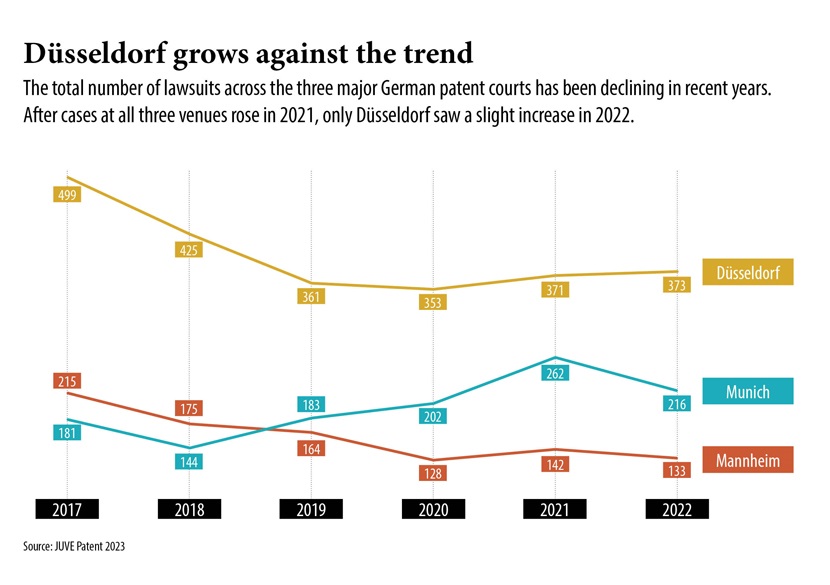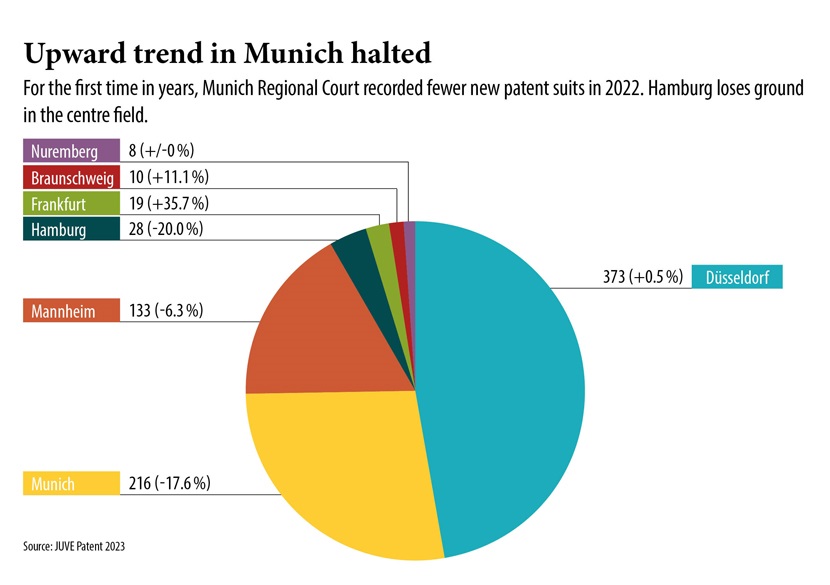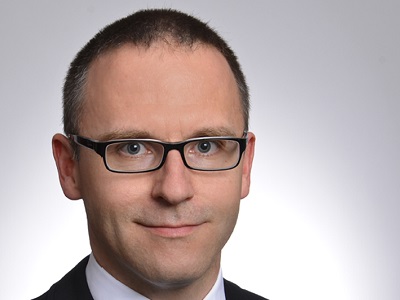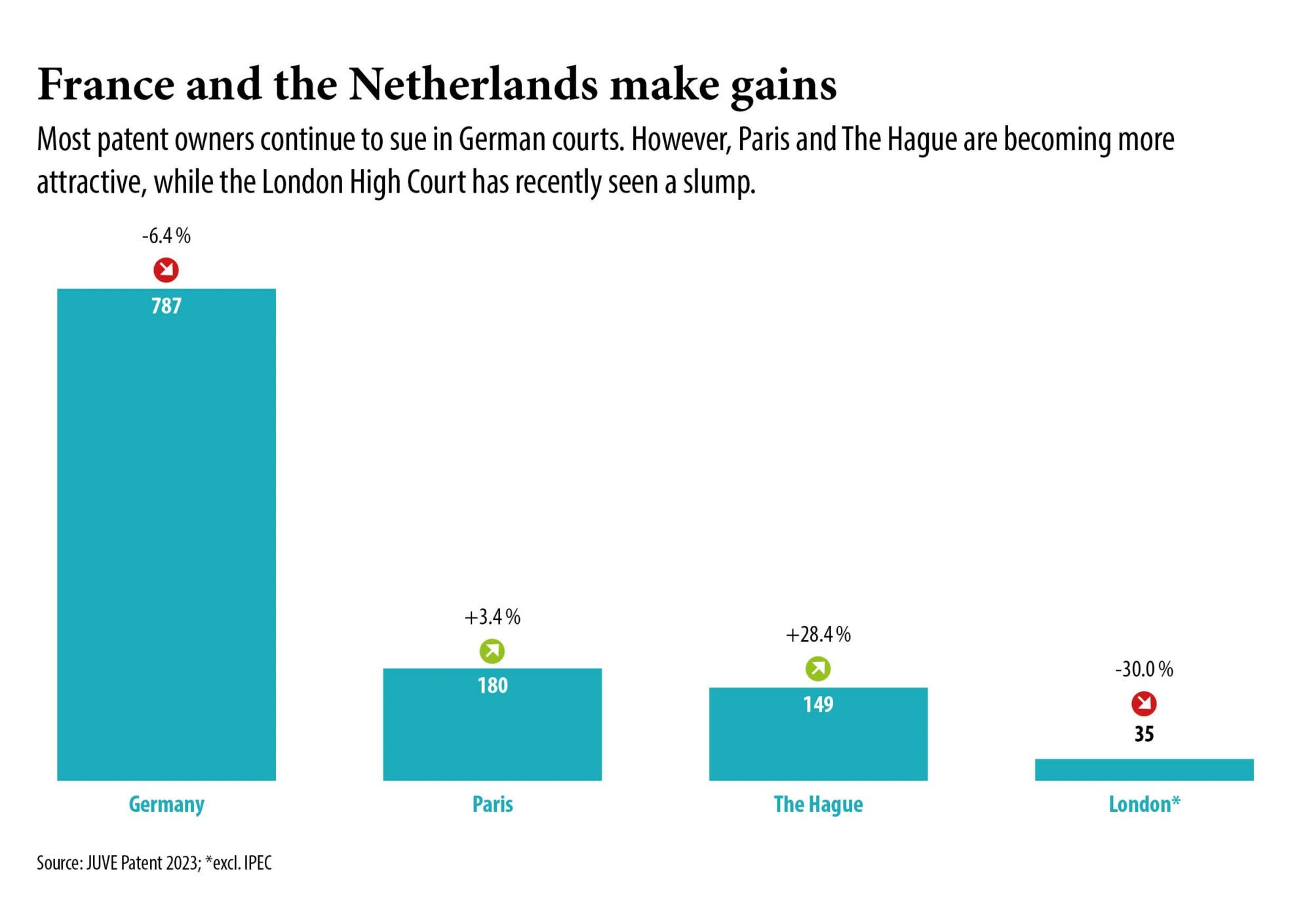Germany’s case numbers drop, but Düsseldorf remains most important patent location
Nowhere else in Europe do patent owners and users argue as extensively as in Germany. Despite this, case numbers in the country are dropping, with the number of new lawsuits filed over technical property rights having declined for years. In 2022, only Düsseldorf bucked the trend. Meanwhile, other countries such as France and the Netherlands, which play a major role in the new Unified Patent Court, have recently seen a significant increase in cases.
21 June 2023 by Konstanze Richter
In 2022, patent owners showed restraint when it came to filing new patent suits in Germany. Case numbers have once again decreased. In total, the seven most important German courts, which have specialised chambers for patent disputes, recorded 787 new proceedings for technical property rights – a decrease of just under 6.4% compared with the previous year. At 722 new cases, parties filed the majority of cases at the three major patent locations of Düsseldorf, Munich and Mannheim.
Over the past six years, case numbers in the German courts have been a rollercoaster. They have, for the most part, remained below the 800-case mark. The anomaly is 2021, the second year of the COVID-19 pandemic, when patent owners were surprisingly willing to sue. That year, they filed significantly more cases than in previous years, with German patent chambers recording an overall increase in case numbers of more than 9.6%. At 841 cases, the total once again surpassed the threshold of 800.
However, the decline in 2022 confirms the overall downward trend of recent years.
Düsseldorf holds its own
Düsseldorf continues to assert itself as the most important patent location in Germany. In total, patent owners filed 373 new lawsuits at the three IP chambers between January and December 2022. In the same period, parties settled 412 proceedings, 102 of these by judgment.
Thus, at 0.5%, the capital of North Rhine-Westphalia saw a slight increase in the number of new patent cases, while the number of settled cases – whether by judgment or otherwise – simultaneously increased by 7.5%. The city therefore continues to lead the way in Germany’s case numbers for patent.

The three IP chambers 4a, b and c, under presiding judges Bérenice Thom, Daniel Voß and Sabine Klepsch, were particularly busy with complex disputes concerning medical technology and pharmaceuticals. For example, they recently handed down important judgments in proceedings between Insulet and Berlin Chemie concerning insulin pumps, and in Boston Scientific against Cook concerning compression clamps. They have also conducted cross-border patent disputes involving many parties concerning the two multiple sclerosis drugs, fingolimod and Tecfidera. High-profile lawsuits by CureVac and Moderna against Pfizer and BioNTech over Covid19 vaccines are also pending at Düsseldorf Regional Court.
No other German patent court has such a strong profile for lawsuits in the life sciences sector as Düsseldorf Regional Court. But patent holders also like to sue in Düsseldorf for other technologies, as shown by the lawsuits filed by MU Iconic against CATL, and Opel over e-batteries. Koroyd also sued Burton over ski helmets.
In mobile phone cases, the Munich and Mannheim regional courts are now ahead of Düsseldorf. However, the latter continues to see large series of lawsuits such as the two largest global SEP battles in 2022 between Ericsson and Apple. It was also the setting for the ongoing dispute between Nokia and Oppo.
Munich slumps after years of highs
Munich has clearly benefited from its reputation as an attractive location for mobile phone lawsuits. But, for the first time in years, Munich Regional Court recorded a decline in new patent cases. While the first-instance court in the Bavarian capital counted a record 262 new lawsuits the previous year, the number dropped to a still-impressive 216 newly filed cases in 2022.
At the same time, the judges of Munich’s three patent chambers handed down 55 judgments, 12% more than the previous year. A further 184 proceedings were otherwise resolved, for example by settlement, withdrawal of suit or mediation – a decrease of 12% compared to 2021.

In addition to the 7th and 21st Civil Chambers, the Munich court also established the 44th Civil Chamber in mid-2021. In the first year, 29 new cases were pending at the new chamber, with seven settled by judgment and a further 17 actions settled by other means.
However, at the beginning of 2023 there came a surprise. According to the business distribution plan, no new patent cases were to be assigned to the 44th Civil Chamber under presiding judge Anne Fricke in the future. Such cases will now only go to the 7th and 21st Civil Chambers. Although JUVE Patent is as-yet unaware for the reasons behind this change, experts suspect that the decline in the number of lawsuits, as well as the UPC’s launch, played a role.
Number one for mobile communications
For several years, holders of patents essential to mobile communications standards have held the Munich Regional Court in high regard. Judgments in mobile communications disputes have once more dominated, for example the Access Advance vs. TCL case. Georg Werner presided over this case, although the young judge only took over the position of presiding judge at the 21st Civil Chamber at the beginning of 2022.
His appointment followed long-time presiding judge Tobias Pichlmaier moving to the antitrust chamber. Werner attracted attention with his injunction rulings against Oppo in the dispute with Nokia, which resulted in a sales stop for Oppo’s devices in Germany.
In the mobile communications sector, Munich has recently been in the spotlight for its decisions regarding anti-suit injunctions (ASIs). Such cases have largely contributed to the case numbers at this court. Through such injunctions, parties attempt to prevent opponents from filing counterclaims in other countries. Between 2019 and 2021, Munich Regional Court issued a very large number of anti-anti-suit injunctions (AASIs) against ASIs from China and the US at the request of SEP holders.
These ASIs and AASIs continue to enjoy great popularity in Munich, although up to now have been mainly prevalent in mobile communications. However, this changed in May 2023 when the Munich Regional Court ordered, for the first time, an AASI against NanoString in its dispute with 10x Genomics. The US company had filed its 2022 infringement suits in Munich.
The presiding judge in the case, Oliver Schön, had only succeeded Matthias Zigann as presiding judge of the 7th Chamber in early 2023. Zigann was presiding judge of the regional court’s oldest patent chamber for many years, before moving to the Higher Regional Court Munich in November 2022.
Mannheim case numbers decline
Mannheim, the third most important patent court, also recorded a decline in the number of new proceedings. With 133 newly filed cases, the 2nd and 7th Civil Chambers at Mannheim Regional Court under presiding judges Holger Kircher and Peter Tochtermann were 6.3% behind the previous year which saw 142 new cases, but still above the first COVID-19 year of 2020, at 128. The court did not provide any information on the number of completed cases.
Similar to Munich, SEP lawsuits have recently been at the forefront in Mannheim. For example, the judges at Mannheim Regional Court reached a verdict in the complex dispute between Nokia and Vivo and conducted the proceedings between Apple and Ericsson, until they reached a licensing agreement in December 2022. The dispute between Nokia and Oppo also continues to occupy the court.
Hamburg narrowly holds on
Hamburg has ranked fourth among German courts for patent suits for years, but once against it has lost ground. With 28 new cases filed, the regional court counted seven fewer patent suits, thus 20% fewer than the year before. In the same period, the 27th Civil Chamber decided 20 cases by judgment. Parties settled a further five by other means.

Stephanie Zöllner
At the same time, the court of first instance lost a renowned patent judge. In summer 2022, Stephanie Zöllner moved to the 3rd Civil Senate at Hamburg Higher Regional Court, which is also responsible for IP. As her deputy, judge Arne Führer initially conducted the business of the 27th Chamber on a provisional basis until Sebastian Weihrauch took over the role at the beginning of 2023.
He was previously a judge at the 3rd Civil Senate of Hamburg Higher Regional Court, where he also dealt with disputes in trademark, patent and unfair competition law.
After a sharp decline in previous year, Frankfurt made some gains. With a total of 19 new patent suits, the court recorded an increase of almost 36% compared to the 14 proceedings in 2021. But despite this increase, Frankfurt is also seeing an overall decline; just a few years ago, the number averaged 30 new lawsuits a year.
German judges dominate UPC
The much-publicised appointment of several Germans as judges at the UPC already caused movement at the national courts in 2022 and 2023.
A total of eight experienced first-instance judges occupy the four local chambers of the UPC in Germany, including Bérenice Thom and Ronny Thomas in Düsseldorf. Thom is currently chair of the 4a Chamber at Düsseldorf Regional Court, while Thomas was a judge in the Düsseldorf Higher Regional Court’s patent senate.

Ronny Thomas
The appointment of Ronny Thomas was a particular surprise. The deputy presiding judge of Thomas Kühnen’s 2nd Civil Senate at Düsseldorf Higher Regional Court is not well known among the international patent community.
Thomas now heads the Düsseldorf local division of the UPC. One of the few full-time UPC judges, he is also a member of the nine-member presidium.
No less surprising was the appointment of Sabine Klepsch, presiding judge of the 4c Chamber at Düsseldorf Regional Court, to the local division in Hamburg. She will serve alongside Stefan Schilling, judge at the 5th Senate at Hamburg Higher Regional Court.
Klepsch has a reputation for extensive experience in mobile communications and life sciences litigation. It is therefore likely that UPC officials want to ensure Hamburg receives a good caseload.
Old acquaintances
The UPC has appointed two highly experienced patent experts, Tobias Pichlmaier and Matthias Zigann, at the UPC local division in Munich. They gained great renown in patent litigation as long-standing presidents of the IP chambers 7 and 21. However, both left these positions shortly before the UPC came into force. Pichlmaier moved to the antitrust division at the Regional Court Munich in early 2022, while Zigann became a part-time presiding judge of a senate at Munich Higher Regional Court in autumn 2022. He will spend the rest of his time heading the UPC local division.
In Mannheim, too, plaintiffs and defendants will encounter old acquaintances at the city’s UPC local division. The long-standing presiding judges of the patent chambers at Mannheim Regional Court, Peter Tochtermann and Holger Kircher, will sit on the bench of the UPC. Tochtermann heads the Mannheim division full-time. Like Ronny Thomas from Düsseldorf, he is also a member of the UPC presidium.
High workload expected
Although the majority of the appointed judges will initially work part-time for the new court, experts already expect numerous patent owners to file lawsuits at the UPC – especially SEP owners in mobile communications. The court is expecting high case numbers, especially in the first few months.
The court opened its doors on 1 June. According to JUVE Patent’s information, 20 lawsuits were received by the new court in the first two days. However, like three lawsuits filed by 10X Genomics against NanoString, they come from the life sciences sector and not from mobile communications.
The big UPC rush is still to come, but numerous law firms are preparing lawsuits. In talks with JUVE Patent, lawyers expressed concerns even before the launch that national proceedings could possibly take longer in the future due to the expected rush on the UPC and the associated workload for its part-time judges. This is because the UPC has very strict deadlines. Many fear that national proceedings could take longer as a result.

Klaus Grabinski
The UPC has also appointed renowned judges from the higher courts. Klaus Grabinski, previously deputy presiding judge of the 10th Civil Senate at the German Federal Court of Justice, which is responsible for patents, took over one of the few full-time positions at the new court as president of the UPC’s Court of Appeal. In this capacity, Grabinski is also the president of the UPC as a whole.
Patricia Rombach also moved from the Federal Court of Justice to the UPC Court of Appeal. Long-time presiding judge of the 15th Civil Senate at Düsseldorf Higher Regional Court, Ulrike Voß, is head of the central division in Munich.
London case numbers decline
However, much more dramatic than the German case numbers is the recent development of the UK High Court in London. Although it is the UK’s principle patent court, after a steady decline from 85 newly filed patent cases in 2017 to 50 in 2021, the number of cases fell by 30% to 35 in 2022.
While the High Court handles the large, commercially important cases, the Intellectual Property Enterprise Court (IPEC), also based in London, deals with smaller amounts in dispute. Last year, the total number of new IPEC suits also reached a record low of 112. Experts estimate that typically 15% to 20% of IPEC cases involve patents, while the rest concern other property rights such as trademarks, utility models or copyrights.
On the other hand, UK judges handed down rulings in some very high-profile patent disputes. For example, the Court of Appeal ruled that Apple must accept court-imposed FRAND licences in a dispute with Optis, as well as recently handing down a global FRAND rate for Apple. In a case involving inner ear implants, the High Court found a patent held by Med-El invalid.
Furthermore, in the first quarter of 2023, the High Court also ruled with global reach. In the SEP dispute between InterDigital and Lenovo, it set a global FRAND licence for the first time since 2019. So far, the UK is the only country in Europe where judges have decided on the amount of such licences.
British judges and lawyers alike suspect that the significant drop in case numbers is due in no small part to the UPC launch. According to UK patent experts, clients are waiting to see how the new court develops. Some are considering filing lawsuits there instead of in the UK.
Onwards and upwards for Netherlands and France
For decades, France played a rather subordinate role in patent disputes. Now, however, the trend is toward more litigation. In 2022, the 3rd Chamber responsible for IP at the first-instance Judicial Court of Paris recorded a record number of 180 newly filed patent suits. This marks an increase of around 3.5% in case numbers. The jump was even more significant from 2020 to 2021, when the 3rd Chamber counted 174 new lawsuits, 20% more than the 145 patent cases in the previous year.

The Netherlands has also recently seen an increase in the number of patent cases. The competent court of first instance, the Rechtbank in The Hague, counted a total of 149 new actions for patents in 2022, an increase of more than 28% compared to the 116 cases in 2021.
Both Paris and The Hague will play an important role at the UPC. The French capital is home to a local division, a central division and the administration of the Court of First Instance. The Hague hosts an important local division.
Originally, London was set to host the third seat of the central division. After the country’s Brexit-related withdrawal from the UPC, there was much discussion about where the third seat should be. Recently, the three major UPC member states France, Germany and Italy agreed on Milan as the third seat. This would give the city, which is also home to a local division, an enormous boost as a patent venue. However, all UPC member states must first agree to the proposal. (Co-author: Mathieu Klos)